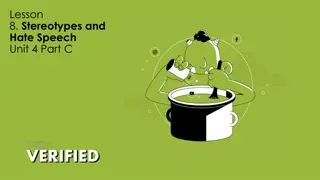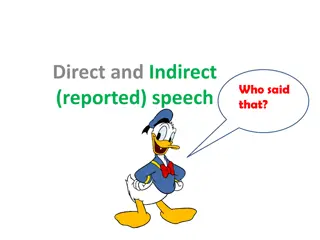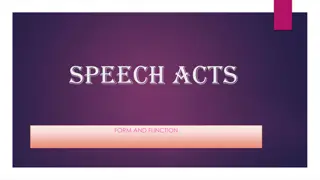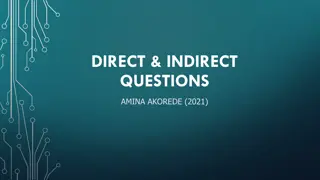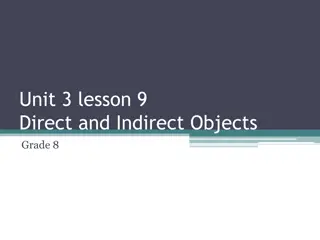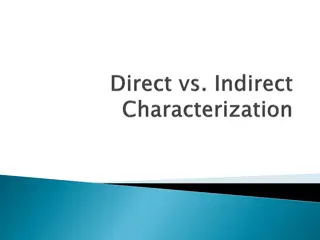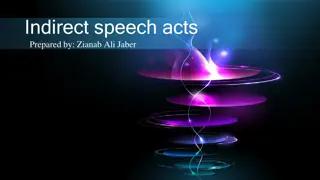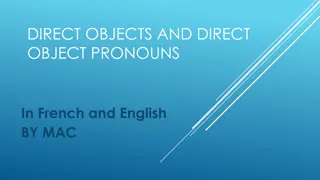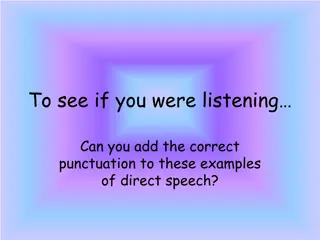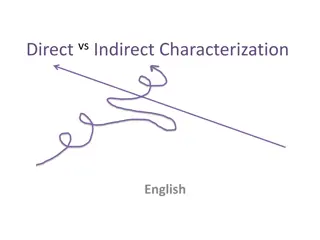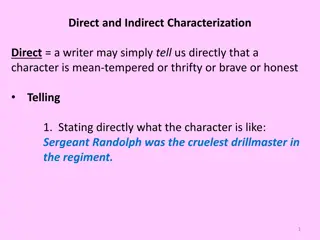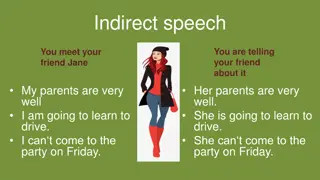Understanding Direct and Indirect Speech in English
Direct speech involves reporting exact words spoken, while indirect speech conveys the same message using different words. Learn about the rules for changing pronouns and key aspects of both direct and indirect speech. Master the art of transforming sentences from direct to indirect speech with ease.
Download Presentation

Please find below an Image/Link to download the presentation.
The content on the website is provided AS IS for your information and personal use only. It may not be sold, licensed, or shared on other websites without obtaining consent from the author. Download presentation by click this link. If you encounter any issues during the download, it is possible that the publisher has removed the file from their server.
E N D
Presentation Transcript
Direct and Indirect Speech Department of English Kanya Mahavidyalaya Kharkhoda Sonepat Haryana
Direct speech is a report of the exact words used by a speaker or writer. The words spoken appear within inverted commas ...... and should be exactly word to word as spoken or written. ( direct speech) Example , " The teacher said to the students, You can go.
INDIRECT SPEECH DEFINITION When we report what someone said in our own words, it is called Indirect speech. We do not use inverted commas, do not write the exact words as spoken or written by someone. ( indirect speech) Generally, the tense changes when we convert direct speech into indirect speech. The teacher said to the students that they could go.
PARTS OF DIRECT AND INDIRECT SPEECH Both direct and indirect speech have two parts which are complete sentences in themselves. They are - Reported verb Reported speech / 1. Reporting verb Who said to whom. ," The teacher said to the students, You can go.
2. Reported speech The exact words spoken, put within inverted commas _______ . _____'' ," The teacher said to the students, You can go.
Rules for changing the pronoun Rule 1: When the pronoun in Reporting speech is in first person, it changes according to the subject of the Reporting verb. Let us see an example- , Ram said to me, I am going. Ram said to me that he was going.
I (first person singular) in direct speech becomes you (second person) in indirect speech as the subject of reported verb you is also a second person pronoun. Let us see another example- , " " They said to me, We are playing. They said to me that they were playing.
Rule 2: When the pronoun in Reporting speech is in second person, it changes according to the object of the Reporting verb. Let us see an example- ," " I said to Ram, You are unworthy. I said to Ram that he was unworthy.
Rule 3: When the pronoun in Reporting speech is in third person, it will remain unchanged in the Reporting verb. Let us see an example- ," " I said to him, Ram is a fool. I said to him that Ram was a fool.
Rules for changing the tense Rule 1: If there is Present or Future tense in the direct speech, then tense of indirect speech will not change. Example of present tense , " He says to me, You are wise. He says to me that I am wise.
Rule 2: If there is Past tense in the direct speech, then tense of indirect speech change as mentioned below. , Direct speechIndirect speech Past indefinite-Past perfect Past continuous-Past perfect continuous Past perfect-Past perfect Past perfect continuous-Past perfect continuous
Rules for changing the Auxiliary verbs Direct speechIndirect speech Will-Would Shall-Should / would May-Might Can-Could Do / does-Did Is/am/are-Was / were Has / have-had
Rule for changing historical truths, universal truths, habitual facts Irrespective of the tense of the direct speech, the tense of indirect speech will not change. Let us see the following examples- ," Teacher said to me, We won the freedom struggle in 1947. Teacher said to me that we won the freedom struggle in 1947.
EXERCISES He told me, My brother wakes up at six every morning. He told me that his brother woke up at six every morning. 2. Teacher told the boys, The Earth revolves around the Sun. Teacher told the boys that the Earth revolves around the Sun. 3. You said to me, I am working. You said to me that you were working.


